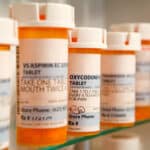Vyvanse Vs. Dexedrine | Is Dexedrine Better Than Vyvanse?
- How Vyvanse Works
- How Dexedrine Works
- Effects Of Vyvanse & Dexedrine
- Health Risks Of Vyvanse & Dexedrine
- Vyvanse & Dexedrine Addiction Treatment
Vyvanse and Dexedrine are prescription drugs used to treat attention-deficit hyperactivity disorder (ADHD), narcolepsy, and binge-eating disorder.
The major difference between Vyvanse and Dexedrine is their formulations. Vyvanse contains an inactive ingredient, lisdexamfetamine, that must be metabolized to produce effects.
The effects of Dexedrine can last up to 8 hours but the effects of Vyvanse can last up to 12 hours. However, side effects of both drugs are similar, including trouble sleeping, loss of appetite, and dry mouth. In addition, both drugs have similar risks, including dependence and addiction.
How Vyvanse Works
Vyvanse is a prodrug, which means it contains an inactive ingredient, lisdexamfetamine dimesylate, which must be converted into an active drug.
Lisdexamfetamine is attached to l-lysine, an amino acid. When you take Vyvanse, enzymes in the body dissolve l-lysine and convert the drug to dextroamphetamine.
Dextroamphetamine, the same active ingredient in Dexedrine, increases production of dopamine and norepinephrine in the brain. This can help treat ADHD symptoms, including inattention, restlessness, and impulsivity.
Vyvanse is available as a capsule or chewable tablet. Both formulations begin within 90 minutes. Depending on your body’s metabolism, the effects can last up to 14 hours.
How Dexedrine Works
Dexedrine is the brand name for dextroamphetamine, a central nervous system stimulant that increases brain activity. It works similarly to Vyvanse by increasing dopamine and norepinephrine to increase attention and focus.
Dexedrine is available in sustained release capsules, known as Dexedrine spansules, and extended-release capsules. When taken correctly, both drugs are released gradually throughout the day.
Dexedrine starts working during the first hour of taking it and continues to work for up to 12 hours.
Effects Of Vyvanse & Dexedrine
Both stimulant drugs can cause various side-effects, depending on the dose, how it’s taken, how frequently it’s taken, and how long you’ve taken it for. Heavy doses of stimulants are associated with more severe side-effects.
Side-effects of both drugs are similar to other ADHD medications, including methylphenidate (Concerta, Ritalin) and amphetamine/dextroamphetamine (Adderall XR).
Common Side Effects
Common side effects may include:
- difficulty sleeping
- headache
- dry mouth
- constipation
- loss of appetite
- weight loss
- nausea
Serious Side Effects
Side-effects may be mild and lessen as your body adjusts to the drug. However, heavy use of stimulants can cause severe side-effects, including psychosis, paranoia, and hallucinations.
In addition, both drugs affect the body similarly and can result in the following physiological effects:
- increased heart rate
- high blood pressure
- increased breathing
- high body temperature
- raised blood sugar
- decreased blood flow
Health Risks Of Vyvanse & Dexedrine
If the dose is too high or if you mix Vyvanse or Dexedrine with other stimulants, it can cause a potentially life-threatening overdose. A stimulant overdose may result in a heart attack, seizures, coma, and sudden death.
Additional health risks associated with stimulant use include:
Serotonin Syndrome
Taking antidepressants, like monoamine oxidase inhibitors (MAOIs), with stimulant drugs can cause a life-threatening drug interaction, known as serotonin syndrome. Both drugs increase production of serotonin and can cause a toxic buildup of the neurotransmitter in the body.
Signs of serotonin syndrome include:
- agitation
- restlessness
- confusion
- rapid heartbeat
- high blood pressure
- fever
- seizures
- coma
Psychosis
Taking heavy amounts of stimulants for a long period of time can negatively impact brain chemistry. Some people experience severe symptoms of psychosis, including hallucinations, delusions, and paranoia.
Dependence
According to the Food and Drug Administration (FDA), Vyvanse and Dexedrine are both schedule II controlled substances with a high risk of abuse and dependence.
Dependence occurs when the body starts to rely on the effects of the drug. If you become dependent, you may experience withdrawal symptoms if you stop or reduce drug use.
Stimulant withdrawal symptoms may include:
- fatigue
- anxiety
- depression
- increased appetite
- difficulty sleeping
- irritability
- intense cravings
If you or a loved one experiences withdrawal symptoms, a professional detox program can help you recover. During detox, a healthcare provider can help you determine if you have a stimulant addiction and need intensive treatment.
Stimulant Addiction Treatment
In an addiction treatment program, trained professionals can help you learn healthy coping skills and help you improve mental health.
Both inpatient and outpatient treatment centers offer evidence-based treatment options, including behavioral therapy, individual counseling, 12-step facilitation, and support groups.
If you would like to learn how Northeast Addictions Treatment Center incorporates these services into our outpatient programs, please contact us today.
Sources
Written by
Northeast Addition Editorial Team
©2024 Northeast Addition Center | All Rights Reserved
This page does not provide medical advice.



